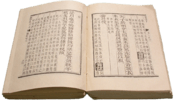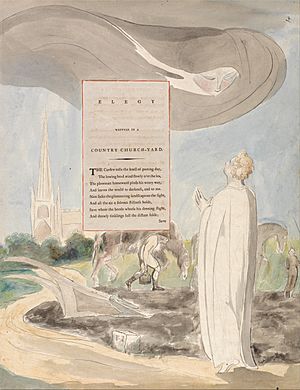Elegy facts for kids
| Literature |
|---|
 |
| Major forms |
| Genres |
| Media |
|
| Techniques |
| History and lists |
|
| Discussion |
|
An elegy is a special kind of poem. It's usually a serious poem that reflects on something important, and in English, it often expresses sadness or a lament (a strong feeling of grief) for someone who has died.
However, the word "elegy" can sometimes be used more broadly. It can mean any text that has a sad or thoughtful tone, or something that helps remember a person or event. But most often, it refers to a poem mourning the dead.
Contents
History of Elegies
The word "elegy" comes from the ancient Greek word elegeíā, which meant "lament." Back then, in ancient Greece, an elegy was any poem written in a specific style called "elegiac couplets." These poems could be about many different things, like death, love, or war. They also included epitaphs (words written on a tombstone), sad songs, and poems written to remember someone.
Because of its flexible structure, the elegiac couplet was also used by Greek and Roman poets for funny, witty, or even satirical (making fun of something) poems.
Some old examples of elegies that were poems of mourning include a poem by Catullus (Carmen 101) about his dead brother. The poet Propertius wrote elegies about his lost love, Cynthia. Even Ovid wrote elegies when he was sent away from his home, comparing his exile to a kind of death.
Elegies in Literature
English Elegies
In English literature, the more specific meaning of an elegy – a poem of sadness for a lost loved one or a tragic event – became common around the 1500s. Before that, the idea was broader. For example, John Donne used the wider meaning for his elegies in the early 1600s.
This older, broader idea of an elegy can be seen in the Old English Exeter Book, written around the year 1000. This book contains serious and thoughtful poems like "The Wanderer", "The Seafarer", and "The Wife's Lament". In these poems, the speaker uses "I" to describe their own sad experiences. They tell a personal story, which is different from epic poetry that tells the stories of a whole group of people.
A very famous English elegy is Thomas Gray's Elegy Written in a Country Churchyard, written in 1750.
Elegies in Other Languages
Elegies are found in many languages around the world.
- In French, a well-known elegy is Le Lac (1820) by Alphonse de Lamartine.
- In Germany, a famous example is Duino Elegies by Rainer Maria Rilke, written in 1922.
- In Spain, one of the most important works in Spanish is Coplas a la muerte de su Padre (Stanzas About the Death of His Father). This was written between 1460 and 1470 by Jorge Manrique.
Elegies in Music
The word "elegy" (or élégie in French) can also describe a type of musical piece. These musical elegies are usually sad or serious.
A famous example is the Élégie, Op. 10, by Jules Massenet. He first wrote it for piano when he was a student. Later, he turned it into a song. Finally, it became a part of his music for a play called Les Érinnyes, where it was called "Invocation" and was for cello and orchestra.
Other musical elegies include the Elegy Op. 58 by Edward Elgar and the Elegy for Strings by Benjamin Britten. Even though it's not specifically called an elegy, Samuel Barber's Adagio for Strings also has a very sad and thoughtful feeling, much like an elegy.
See also
 In Spanish: Elegía para niños
In Spanish: Elegía para niños
- Dirge
- Elegiac
- Funeral march
- Keening
- Kommós
- Lament
- Marsiya
- Noha
- Obituary poetry
- Pastoral elegy history
- Poetry
- Rithā'
- Soaz
- Threnody
 | James Van Der Zee |
 | Alma Thomas |
 | Ellis Wilson |
 | Margaret Taylor-Burroughs |


